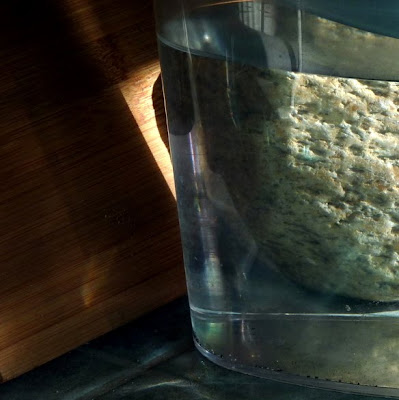~ By the old railtrack, where we sometimes walk, is a yard, once perhaps a siding for the railway, now a place of light industry. There is a a scruffy concrete and corrugated workshop full of tools and machinery, which I rather like, at one end, and a little garden at the other, bright and flowery and well-tended, terraced up the slope. Two elderly women, both in print skirts, striped and floral, t-shirts and cardigans in greys and pinks, stand talking animatedly, beyond my hearing over a courgette plant, two large fruits of which one is carrying under her arm. They gesticulate and wag fingers, then suddenly bob towards each other and kiss on both cheeks symmetrically, whether in belated greeting or premature goodbye is not clear, as they go on talking afterwards without apparently any intention of parting.
~ I park right up by the church, which is shady and quiet, though a heavy haul back up afterwards with a full basket. The smells of the market drift up the hill, paella and cheese and roasting chicken and charcuterie and frying pancakes. I buy Cornish pasties (yes really, I know I know, but they're a charming anglo-French couple who sell them and the pasties really are good ones, please don't tell the I'm-more-French-than-the-French-and-what-did-you-want-to-come-to France-for-anyway brigade...) for lunch for us today, olives and red onions and feta cheese and fresh figs for friends for dinner tomorrow, and, from a beguilingly louche and gaudily cheap stall I've not seen here before, gold nail varnish for my toenails for who knows when.
~
Mineral, filtered, clear.
Light coming into the kitchen. Nothing arranged, or I might not have chosen a plastic water bottle - fizzy, another moral compromise; I don't buy the still stuff but use the filter jug behind. I liked its refractions anyway.



9 comments:
Lucy, what is that object in the water jug? It looks like a sponge but, then, I don't have my glasses on.
Your lunch sounds great, by the way.
Fairies in the kitchen.
I appreciate how so much can be assumed from the actions of these two women. The description is so good.
How lush life seems, reading this. Wonderful writing, Lucy.
yes, what is that thing in the water filter jug? I think we should be told...
Thank you, lovely to see you and welcome Catherine.
The mystery object is the kitchen rock, a large granitey pebble, used to prop up the chopping boards, previously it used to hold open windows. It has featured before, in this post, and this photo.
Hah! So I was viewing it through the water jug, not in it. Well, don't I feel silly. I didn't understand what I was looking at.
And this is why police take what witnesses say with a grain of salt until it can be proven or corroborated by other witnesses or by other evidence. We humans don't always 'see' what we think we do.
Cool!
What a pleasing image, the ladies formally kissing as they converse.
I wonder if the the Cornish pasties are prepared using raw meat with the vegetables before baking. Some people, never Cornish people, cook the meat first. Raw meat and raw vegetable should go into the pasty before baking. As the pasty cooks, it generates its own gravy.
Crow - well, it just goes to show... :~)
Plutarch - the meat is in ample sufficiency, and very tender and flavourful, and there is not too much turnip! I always rather hankered to make a real steak and kidney pudding or pie in the way you describe, but sadly no one round here likes S & K enough to make it worth my while.
The pasty people do other flavours, like chicken and ham and lamb and something and pork and apple, which are all OK, but I like a classic pasty myself. There was quite a discussion going over at Avus' place with out friend BB about the pros and cons of the pasty. Also another at an expat blog I don't normally frequent where Brits in France who seek out the foods of home were being castigated for so doing, hence my reference. I could see both sides to a point. I rather reckon the curiosity and easy traffic between the western Celtic fringes make a Breton-Cornish alliance in a market place in the Penthievre culturally enriching rather than anything else. They certainly seem to do very well, and not everyone queuing there is British.
Post a Comment